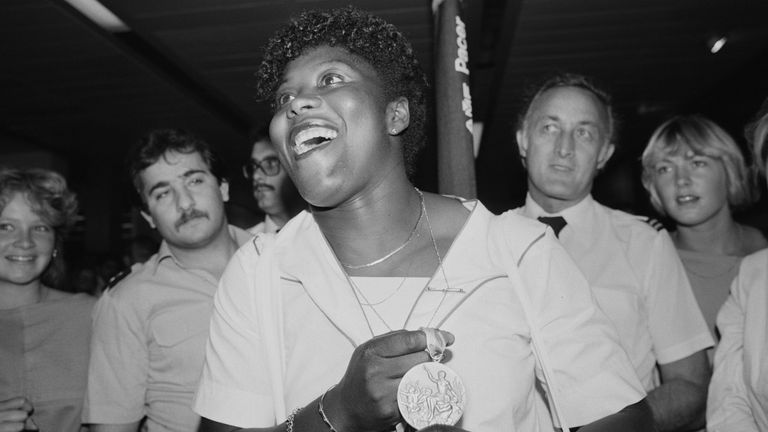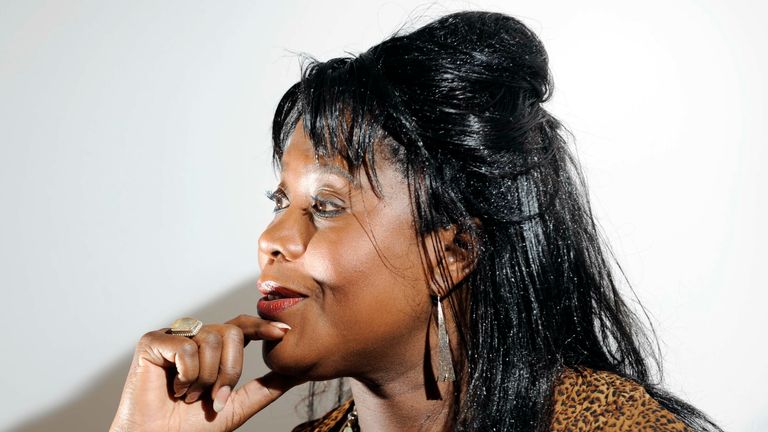Tessa Sanderson: Olympic champion still determined to break down barriers
As Black History Month continues, the first black British woman to become an Olympic champion talks records, racism and boardroom aspirations
Tuesday 6 October 2020 16:41, UK
Tessa Sanderson claps, then rocks back her head, eyes closed, before raising her hands, almost in rapture as she recalls the javelin throw that wrote her name into the history books and confirmed her status as a true black sporting pioneer.
The scene she is describing is the 1984 Olympic final in Los Angeles. Her great rival Fatima Whitbread has recorded a decent opening effort. Now it is Tessa's turn.
- Ralph Rowe: Britain's first black Paralympic athlete
- 'Maggie the Machine' - the girl who never gave up
- Bill Richmond: From slavery to sporting stardom
"I just remember thinking, 'please God let it be right', and I just came in so fast because I was a speed thrower and all I kept thinking was, 'leg down, leg down, leg down', like my coach taught me. The javelin was in such a perfect position.. my whole body went right through it…It was heavenly, like, 'oh God this was a fantastic throw'. It came up a new Olympic record and I thought, 'Ok you lot. Beat that!'".
No one could. Sanderson's first-round throw of 69.56m was enough to make her the first black British woman to win Olympic gold. She remains the only British athlete to win an Olympic throwing event.
"Winning that Olympic gold medal was bigger than anything I've ever achieved... It was a marvellous feeling. I've done it for myself, I've done it for my family, for my coach, for my country as well. It's just a wonderful feeling".
And to think, it all began with a portion of chips.
"It was a bet that I had between the girl who was better at throwing the javelin at school and myself. And it was all for a bag of chips, believe it or not. If she won, or I won, someone would have to buy the chips for the whole week. So of course I made sure I won for tuck-shop money."
It earned her more than an after-training snack. Tessa threw far enough to qualify for the English Schools Championships, and it set her off on a career path that would take her to a British record six Olympic Games, an Olympic gold, three Commonwealth titles and a CBE.
And no one could ever say Tessa did not earn everything she has achieved…
Born in Jamaica, she lived with her grandmother after her Windrush generation parents headed off to find work in England.
Tessa did not join them in Wolverhampton until she was six years old, arriving in an unfamiliar country having been warned, "it's so cold in the UK, if you touch your nose it's going to fall off". If that wasn't quite true, there was still good cause to be wary. "You got called the 'N' word, and that symbol they had on the jam jars. I got spat on by a boy in school…my sister fought my battles for me…she sorted him out".
Although there were sometimes tears, Tessa credits her parents for preparing her for the battles that lay ahead. Even in '84, after that Olympic triumph, it was her father who told her to bin the letter she received on her return from LA that read: "You won your gold medal. Fantastic. But you're black. You're not British and you never will be".
Offensive correspondence was not the only thing Tessa had to contend with following that historic victory. It did not turn out to be the life-changing event you might expect.
Although Olympic gold earned her fame, it did not pay the bills. Even as an established international athlete of many years, Tessa had still been working full time, but just weeks after that glorious night in the Colosseum she was jobless, the business she worked for having gone into liquidation. "I had an Olympic gold, no sponsorship money…what the hell am I going to do? Pick up the pieces and make things work".
For a while she contemplated retiring from athletics. The javelin was not a blue-riband event, there was not a great deal of money to be made in what was still an amateur sport. And on top of that Tessa felt other athletes were often treated better.
"I don't believe it was a black thing. But back then I accepted it because there was not much that I could do. Black athletes didn't have the voice they have now, so I just had to fight my own battles."
Tessa feels the situation has since improved, and is encouraged by the response from black sportsmen and women demanding change following the police killing of George Floyd in America and the subsequent Black Lives Matter protests.
"A lot of that has changed now and the voice is there," she says. "I do think that coming together now is so important. It's given everyone the voice to say, 'we don't want this'. It is the right time. It should have happened way, way back. But now they have the voice to do that."
One place where Tessa believes that voice is not yet prominent enough is within sport's governing bodies. She was made vice-chair of Sport England in 1999, the first woman to take the role, but after a recent report revealed just three per cent of those sitting on the boards of British sporting governing bodies come from a BAME background, Tessa says the lack of representation is hard to justify. "I think it's a total disgrace that so many black sportsmen have achieved so much for this country and we're still fighting to be in the boardroom. Why is that? I don't understand that because we have the ability.
"We should look blatantly at equality, we should look at the level black people are. If the face fits, if you have the ability and you know what you're doing, the opportunity should be there."
The spell as vice-chair at Sport England was just one of a number of jobs Tessa has taken on since retiring from competition following the World Championships in 1997.
She has worked as a sports presenter on Sky News, appeared as an after-dinner and motivational speaker and set up her own academy for aspiring young athletes in east London. She still has ambitions of more media work, she would like to be "the Oprah Winfrey of the UK".
Now, 36 years on from that night in Los Angeles she shows no sign of letting up. Her adopted eight-year-old twins keep her on her toes. And it is with them in mind that she welcomes Black History Month and the crucial role of education, saying: "Black History Month is so important, but not just for a month.
"Even black people themselves need to be educated about the wonderful things that black people have done."
Wonderful things like being the first black British woman to become an Olympic champion.







